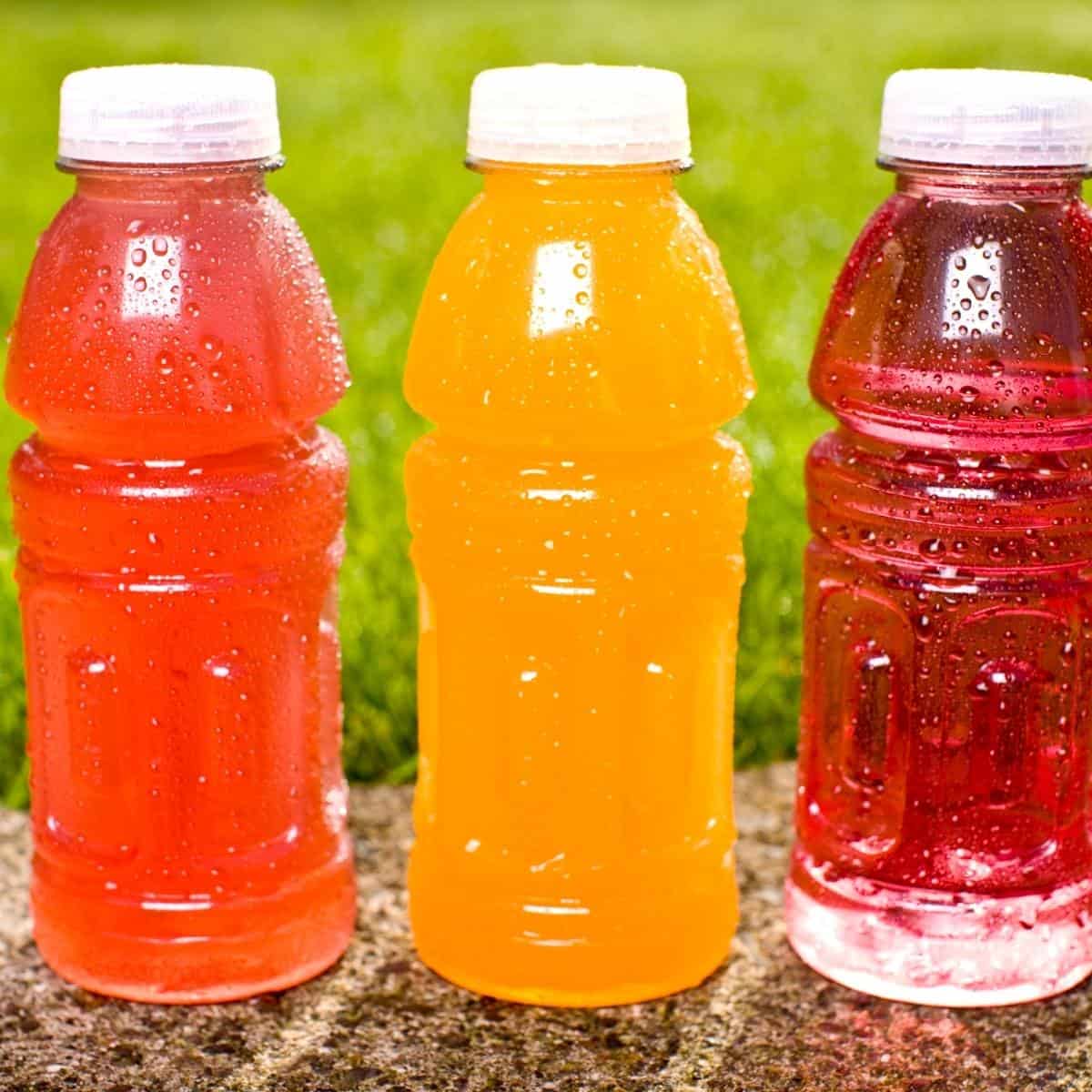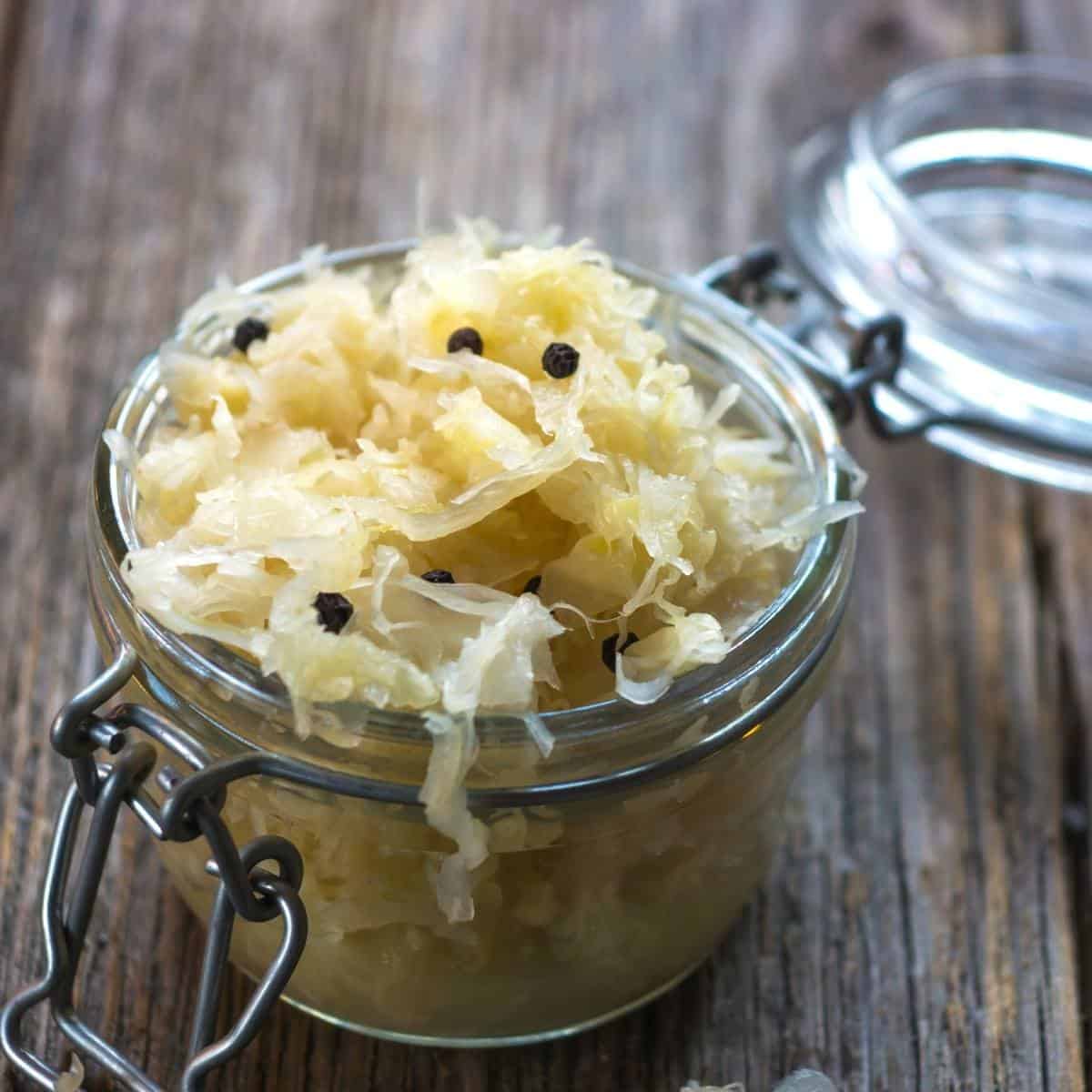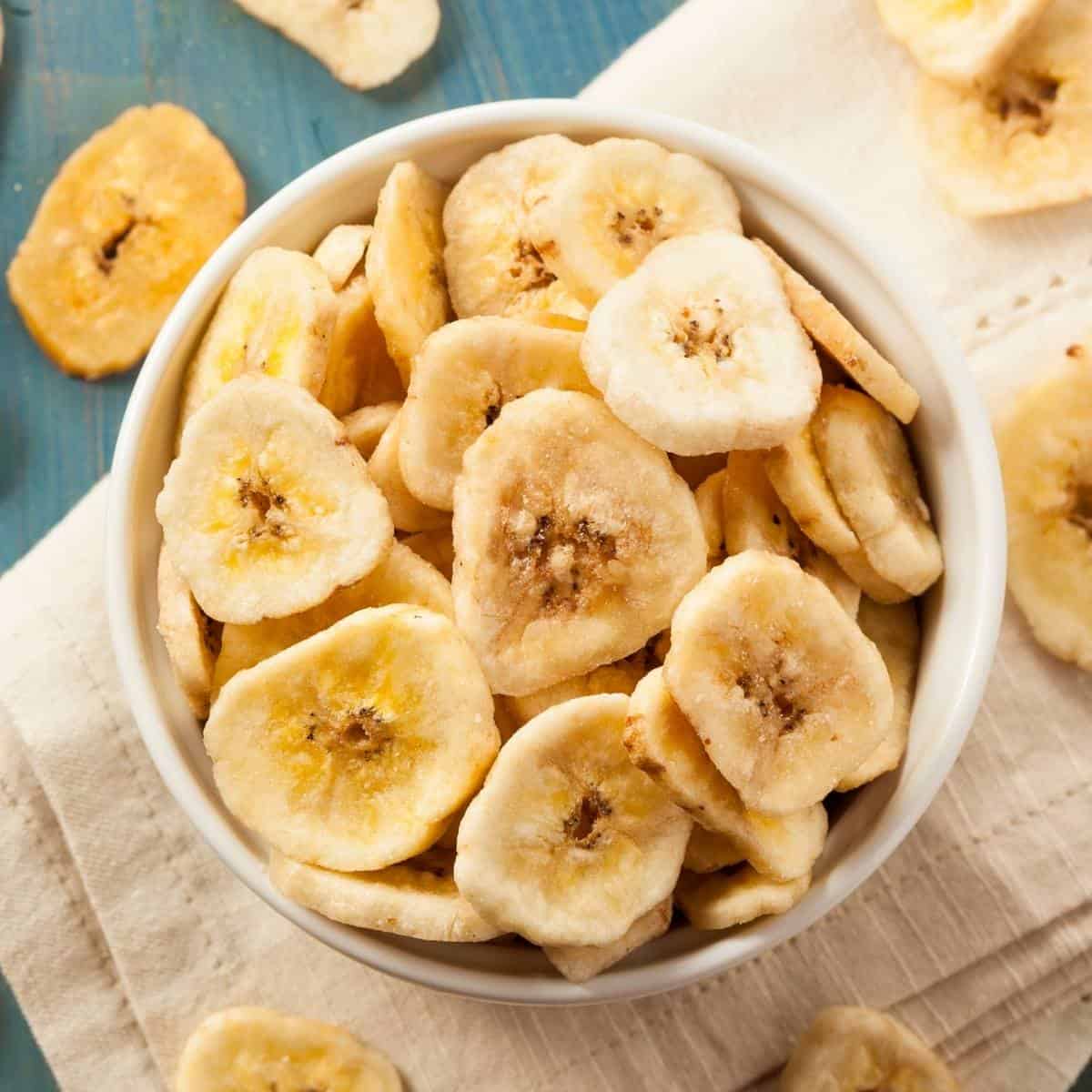Is Pineapple Safe for Dogs?
So what’s the deal with dogs and pineapple? Is it toxic? Can puppies eat pineapple? Does it provide your dog with any nutrition? Find the answers to all of your questions when it comes to your canine and this tropical fruit.
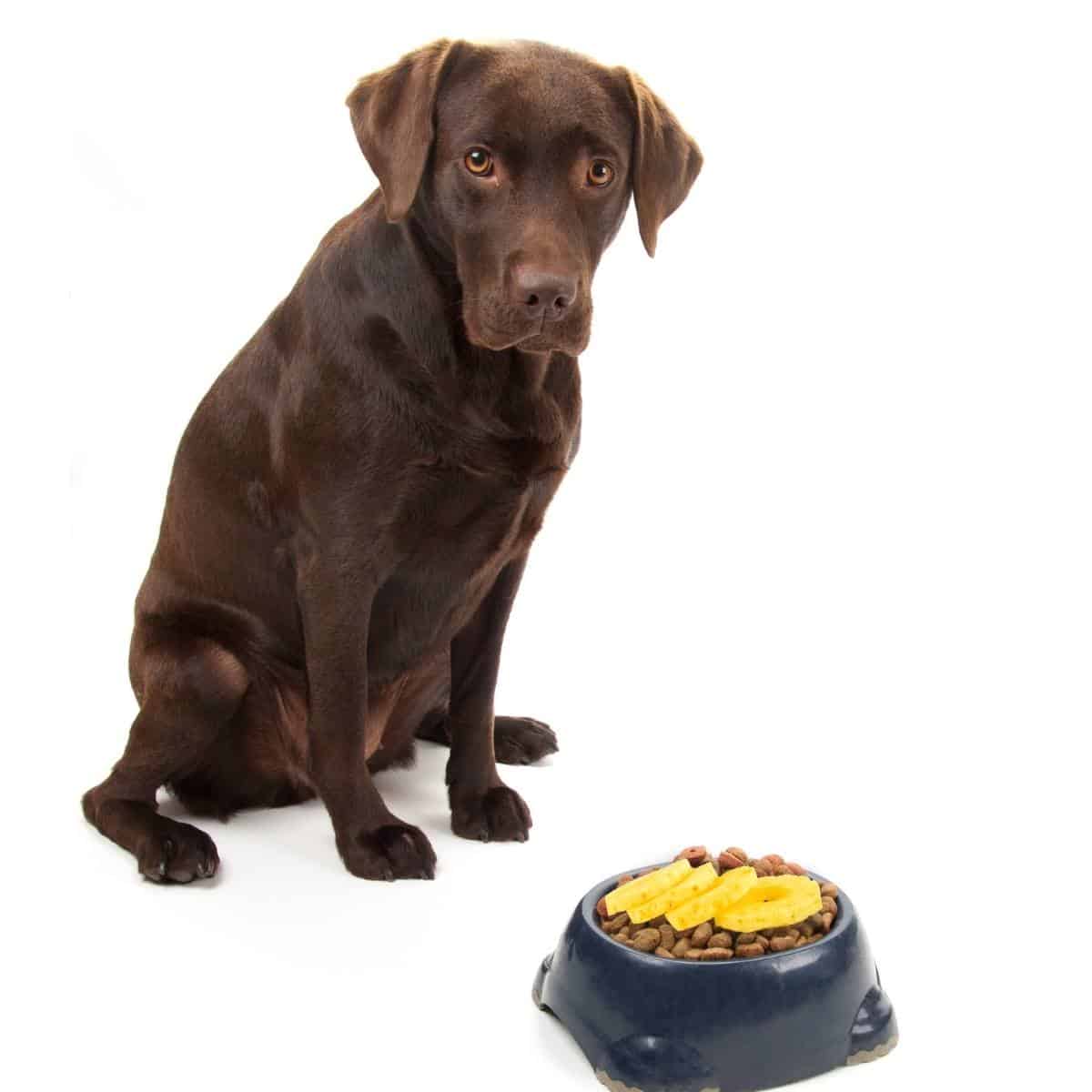
You may be questioning if it’s okay for your dog to eat pineapple. Spoiler alert, yes it is! But keep reading to learn more about the health benefits, which pups should avoid this fruit, and how much you should give them.
If you have had doubts about pineapple, you may be wondering if papaya is safe for your pup or even acai as well!
These tropical fruits are indigenous to South America, where they have been cultivated for many centuries. Pineapples are not only safe for dogs but also pack a nutrient-dense punch.
They are tangy and filled with vitamins and minerals that help support a dog’s health and hydration. However, like any dog-safe fruit, pineapple should be given in small amounts.
Larger servings may result in problems with digestion and obesity. Raw pineapples contain high sugar levels. They should, therefore, never be a large part of your canine friend’s diet.
Health Benefits of Pineapple
Pipelines offer a ton of nutrients to both dogs and humans. Below are some of the most valuable nutrients and vitamins.
Vitamin C
Vitamin C helps regenerate tissues, boosts immunity, protects the dog against heart disease, and lowers cholesterol levels. Be cautious not to go overboard as too much vitamin C can result in stomach upsets and other illnesses.
Vitamin B1
This vitamin is also referred to as thiamine. It is a vital mineral for dogs as it ensures healthy eyesight and aids the optimal functioning of the brain and heart. Usually, any unused amount of vitamin B1 is peed out of your dog’s body. You should, therefore, not worry about feeding him too much of it.
Vitamin B6
Vitamin B6 builds proteins, helps with growth and development, maintains hormones, regulates fluid imbalance, regulates the production of red blood cells, and also regulates hormones as well as the overall mood of your pooch. Like vitamin B1, this vitamin is important for your dog and is often found in good-quality kibbles. So, a few pineapple chunks can improve your dog’s mood if he is a bit down.
Bromelain
Bromelain is an enzyme with anti-inflammatory properties. It works like natural histamine and helps with skin issues.
Manganese
Manganese helps support a healthy skeletal structure and acts as a catalyst for your dog’s organ and enzyme functions.
Hydration
Pineapple contains 86% water, making it an excellent choice for natural hydration. These fruits are especially important in the summer months when dog owners can chop them up and place them in a freezer for sweet frozen treats.
Fiber
Pineapples are rich in dietary fiber, which is vital for your dog’s digestive system. Dietary fibers ensure smooth bowel movements and help prevent constipation in dogs and humans as well.
Pineapples also contain vitamins A and K, potassium, calcium, magnesium, iron, zinc, copper, riboflavin, niacin, phosphorus, folate, and antioxidants that help repair damaged cells.
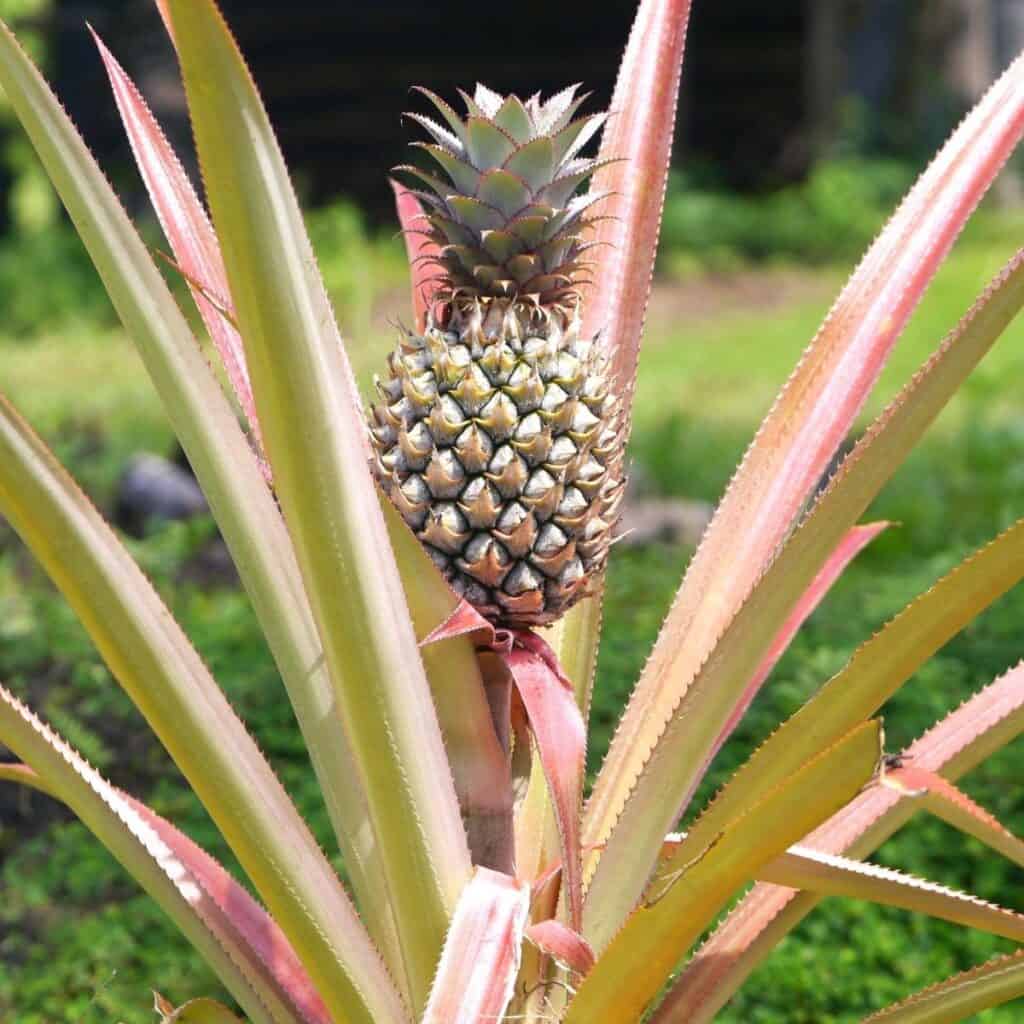
Is Pineapple Toxic To Dogs?
No, in general pineapple is not toxic to dogs.
Raw pineapples are an excellent source of nutrients for your dog, provided you stick to feeding him only small amounts of pineapples and other fruits with his food.
Large amounts of pineapple are never suitable for your pooch because they are high in sugar. On the contrary, small amounts of pineapple are suitable for your canine friend and are natural anti-inflammatory treats full of dietary fiber and vitamin C.
You should only feed your dog pineapple flesh (in bite-size pieces) and avoid giving them the prickly peel and crown. This will help to keep them from choking and aid in better digestion.
Does Pineapple Give Dogs Diarrhea?
While fiber can be beneficial in small amounts, too much of it can result in digestive issues, including constipation and diarrhea. For dogs with sensitive stomachs, even the smallest amount of pineapple can result in a stomach upset.
Can Dogs Drink Pineapple Juice?
To answer simply, yes, but in small amounts. Pineapple juice has a high sugar concentration compared to the actual flesh, and too much sugar is not suitable for your dog, especially if the dog is older or diabetic. You should only give him pineapple juice if it is a fresh juice with no additives.
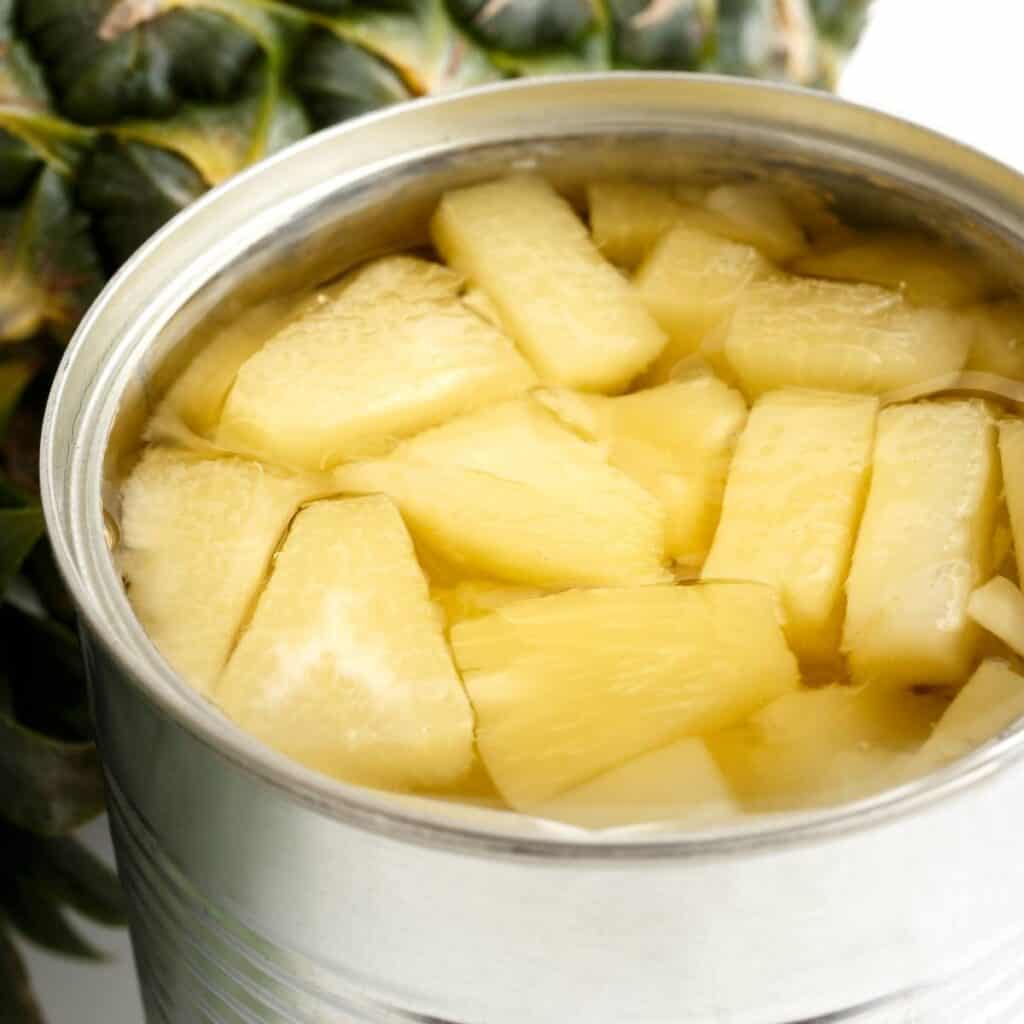
Do Pineapples Stop Dogs From Eating Poop?
It is said that pineapples stop dogs from eating poop over time because the fruit alters the stool and makes it unappetizing to your pup. This is, however, not been scientifically proven.
Should I Give My Dog Pineapple Out Of The Can?
Only if the pineapple is in 100% real juice. Many canned fruits and fruit cups contain sugar syrup, which has been added and isn’t natural. While pineapple can be a good snack for dogs, you definitely want to avoid extra processed sugar when possible. It’s just too much for their bellies to handle and can contribute to obesity.
Can Puppies Eat Pineapple?
Yes, in much smaller servings. Because they are smaller than full-grown dogs, they should intake less. Always start with just a couple of pieces to ensure it doesn’t cause digestive issues.
What About Cooked Or Dehydrated Pineapple?
Veterinarians do not recommend dried pineapples as a treat for dogs because dried pineapples contain a high amount of sugar per portion.
As the water is removed from pineapples, the fruit portions become smaller, but the sugar content remains the same. On the other hand, cooked pineapple is okay for your dog (such as grilled). You can add pineapple to your usual dog food recipes if the weather is too cold for fresh or frozen pineapples or if your pooch prefers cooked food.

Dog Allergies to Pineapple
While pineapple isn’t considered a common allergy in canines, it is something to keep an eye out for. Mainly because they aren’t used to it, so you really don’t know if they are allergic until they try it.
The reaction may be immediate or worsen over a course of a couple of days. Allergies and sensitivities may include skin rashes, vomiting, and diarrhea. More severe reactions may present themselves with swelling, hives, breathing difficulties, and dehydration.
If you notice anything out of the ordinary, be sure to contact your vet immediately.
Homemade Pineapple Recipes Just For Pups
Making homemade snacks for your dog is fun, just be sure to use safe and whole ingredients. Experiment with the recipes below by freezing the treats in different shapes using silicone molds.
If you don’t want the extra hassle, you can freeze the pineapple like it is so your pooch always have a fruity dessert on hand.
Pineapple Treats and Snacks for Dogs
When you want to add some pineapple into your pup's diet, try making these delicious homemade pineapple recipes, just for canines!
Pineapple Pupsicles Homemade Frozen Dog Treats
These frozen pineapple doggie treats are great for hot summer days and your pup will love them!
How to Make Tasty Pineapple Dog Biscuits for a Fruit-Loving Pup
If you pooch likes dog biscuits, they will love this pineapple version!
Tropical Treasures: Gluten-Free Dog Treats Recipe
You only need 5 gluten free ingredients to make these healthy pineapple snacks.
Frozen Pina Colada Dog Treats
Pups like tropical vibes too! Treat them with a pina colada doggie bone!
Frozen Pineapple Banana Dog Treats
Fruity treats like these are just what you pup wants for dessert and warmer days!
Honest Kitchen Pineapple Dog Treats
These are a soft and sweet treat, so great for dogs with dental issues.
Pineapple for Dogs: The Short Version
Pineapple has tons of vitamins, minerals, and antioxidants. In small servings, pineapple is healthy for canines. Not only can it provide natural and healthy benefits, but it’s also a good source of hydration in the warmer months.
However, dried pineapple and pineapple chips should be avoided. You also want to limit fruits in your dog’s diet. Since they are not a natural part of their diet, sometimes they can cause stomach issues including constipation and diarrhea. If your pooch has diabetes or other medical conditions, it’s best to consult with your local vet for a personal recommendation.








